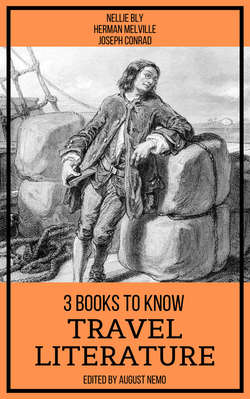Отрывок из книги
Title Page
Introduction
.....
"I came upon him, and, if he had not heard me coming, I would have fallen over him too, but he got up in time. He rose, unsteady, long, pale, indistinct, like a vapor exhaled by the earth, and swayed slightly, misty and silent before me; while at my back the fires loomed between the trees, and the murmur of many voices issued from the forest. I had cut him off cleverly; but when actually confronting him I seemed to come to my senses, I saw the danger in its right proportion. It was by no means over yet. Suppose he began to shout? Though he could hardly stand, there was still plenty of vigor in his voice. 'Go away—hide yourself,' he said, in that profound tone. It was very awful. I glanced back. We were within thirty yards from the nearest fire. A black figure stood up, strode on long black legs, waving long black arms, across the glow. It had horns—antelope horns, I think—on its head. Some sorcerer, some witch-man, no doubt: it looked fiend-like enough. 'Do you know what you are doing?' I whispered. 'Perfectly,' he answered, raising his voice for that single word: it sounded to me far off and yet loud, like a hail through a speaking-trumpet. 'If he makes a row we are lost,' I thought to myself. This clearly was not a case for fisticuffs, even apart from the very natural aversion I had to beat that Shadow—this wandering and tormented thing. 'You will be lost,' I said—'utterly lost.' One gets sometimes such a flash of inspiration, you know. I did say the right thing, though indeed he could not have been more irretrievably lost than he was at this very moment, when the foundations of our intimacy were being laid—to endure—to endure—even to the end—even beyond.
"'I had immense plans,' he muttered irresolutely. 'Yes,' said I; 'but if you try to shout I'll smash your head with—' There was not a stick or a stone near. 'I will throttle you for good,' I corrected myself. 'I was on the threshold of great things,' he pleaded, in a voice of longing, with a wistfulness of tone that made my blood run cold. 'And now for this stupid scoundrel—' 'Your success in Europe is assured in any case,' I affirmed, steadily. I did not want to have the throttling of him, you understand—and indeed it would have been very little use for any practical purpose. I tried to break the spell—the heavy, mute spell of the wilderness—that seemed to draw him to its pitiless breast by the awakening of forgotten and brutal instincts, by the memory of gratified and monstrous passions. This alone, I was convinced, had driven him out to the edge of the forest, to the bush, towards the gleam of fires, the throb of drums, the drone of weird incantations; this alone had beguiled his unlawful soul beyond the bounds of permitted aspirations. And, don't you see, the terror of the position was not in being knocked on the head—though I had a very lively sense of that danger too—but in this, that I had to deal with a being to whom I could not appeal in the name of anything high or low. I had, even like the niggers, to invoke him—himself his own exalted and incredible degradation. There was nothing either above or below him, and I knew it. He had kicked himself loose of the earth. Confound the man! he had kicked the very earth to pieces. He was alone, and I before him did not know whether I stood on the ground or floated in the air. I've been telling you what we said—repeating the phrases we pronounced,—but what's the good? They were common everyday words,—the familiar, vague sounds exchanged on every waking day of life. But what of that? They had behind them, to my mind, the terrific suggestiveness of words heard in dreams, of phrases spoken in nightmares. Soul! If anybody had ever struggled with a soul, I am the man. And I wasn't arguing with a lunatic either. Believe me or not, his intelligence was perfectly clear—concentrated, it is true, upon himself with horrible intensity, yet clear; and therein was my only chance—barring, of course, the killing him there and then, which wasn't so good, on account of unavoidable noise. But his soul was mad. Being alone in the wilderness, it had looked within itself, and, by heavens! I tell you, it had gone mad. I had—for my sins, I suppose—to go through the ordeal of looking into it myself. No eloquence could have been so withering to one's belief in mankind as his final burst of sincerity. He struggled with himself, too. I saw it,—I heard it. I saw the inconceivable mystery of a soul that knew no restraint, no faith, and no fear, yet struggling blindly with itself. I kept my head pretty well; but when I had him at last stretched on the couch, I wiped my forehead, while my legs shook under me as though I had carried half a ton on my back down that hill. And yet I had only supported him, his bony arm clasped round my neck—and he was not much heavier than a child.
.....
